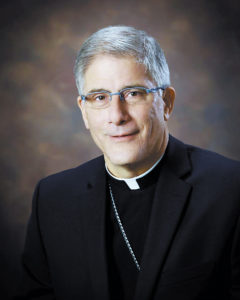
Bishop Joseph R. Kopacz
By Bishop Joseph Kopacz
In many and varied ways we call upon the intercessions of the saints in our prayer, with a singular devotion through Mary, the mother of our Lord, Jesus Christ. Earlier this week we released the names of priests, religious brothers and deacon who have been credibly accused of the sexual abuse of minors. At the same time three special saints, beacons of hope for our troubled times, converged on our liturgical calendar: Saint Patrick (March 17), Saint Cyril of Jerusalem (March 18) and Saint Joseph (March 19).
Saint Joseph is the patron saint of the Universal Church due to his singular vocation in God’s plan of salvation as the husband of Mary and the foster father of Jesus. Saint John Paul II, nearly 30 years ago on August 15, 1989, blessed the universal church with his Apostolic Exhortation, Redemptoris Custos, a document on Saint Joseph as the Guardian of the Redeemer. We chose his feast day, March 19, to release the names of clerics credibly accused of the sexual abuse of minors with the special intention that this guardian of the Redeemer and patron of the Universal Church may renew us in our care for the members of the family of God, the Body of Christ.
In the words and thought of Saint John Paul II we read. “Saint Joseph was called by God to serve the person and mission of Jesus directly through the exercise of his fatherhood. It is precisely in this way that, as the Church’s Liturgy teaches, he cooperated in the fullness of time in the great mystery of salvation and is truly a “minister of salvation.” His fatherhood is expressed concretely in his having made his life a service, a sacrifice to the mystery of the Incarnation and to the redemptive mission connected with it.”
In this light we pray that all ordained for service in the church may dedicate their lives as a sacrifice to the mystery of the Incarnation, the Word made flesh, the Redeemer.
Saint Joseph, ora pro nobis.
On March 18 we celebrated the feast of Saint Cyril of Jerusalem, not well known in the canonized celestial cohort, but whom tradition knows as a great evangelizer and catechist. We entrust to him all catechumens and candidates who seek to be in full communion with the Catholic Church.
On the first Sunday in Lent throughout the Catholic world the Universal Church in the Rite of Election called by name those who are on this journey to full communion at the Easter Vigil. Joy and hope resounded throughout Saint Francis of Assisi Church in Madison two weeks ago when the names of the elect and the candidates were proclaimed. On the other hand, earlier this week we posted the names of all credibly accused clerics who served in the Diocese of Jackson going back to 1924.
Of course, this roll call evokes a range of negative feelings for the most part. Yet, not exclusively, because many are experiencing a sense of relief and pray that a new day is dawning that will allow the Church to move forward in truth and hope. This is not a punitive action on the part of the Church against those who have offended. Rather, the public statement is done for the sake of transparency, the restoration of trust and especially for the healing of victims, their families and the church.
Saint Cyril of Jerusalem, ora pro nobis.
On March 17, the Universal Church could not celebrate the feast of Saint Patrick because it landed on the second Sunday of Lent. (However, for the parade and party devotees Saturday the 16th was just fine.) All of the hoopla and festivities, a great way to mark the transition from winter to spring in the Northern Hemisphere, can too easily overshadow the astonishing spiritual and earth-bound accomplishments of this great saint. There is not enough space in a newspaper, let alone a column to log them all, but one in particular is outstanding as the Catholic Church labors to reconcile the wounds and overcome the scandal of the sexual abuse troubles.
Within the lifetime of Saint Patrick, the nascent Christian era in Ireland eradicated the barbaric human trafficking trade of the pagan Celtic people. They had developed the same system of human destruction that powered the African slave trade which is now featured in the Mississippi Civil Rights Museum. The Church, in recent decades especially, has committed herself to eradicating the scourge of sexual abuse, and to date the tide is turning. With Saint Patrick as our guide, may we redouble our efforts to eradicate the barbaric sin of sexual abuse.
Saint Patrick, ora, pro nobis.
Although lamentation marks every corner of this edition of the Mississippi Catholic the seeds of truth, compassion, justice and healing are already planted and bringing about a new spring throughout our diocese. May the call of the Lord for conversion not fall upon deaf ears during this Lenten season and always.
